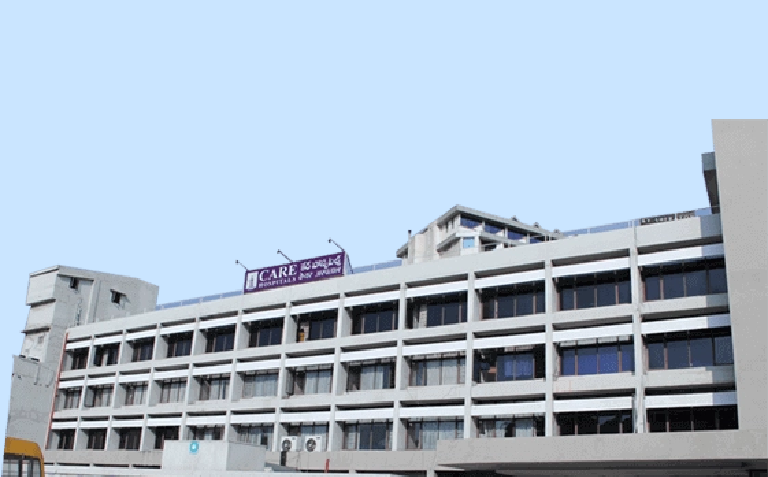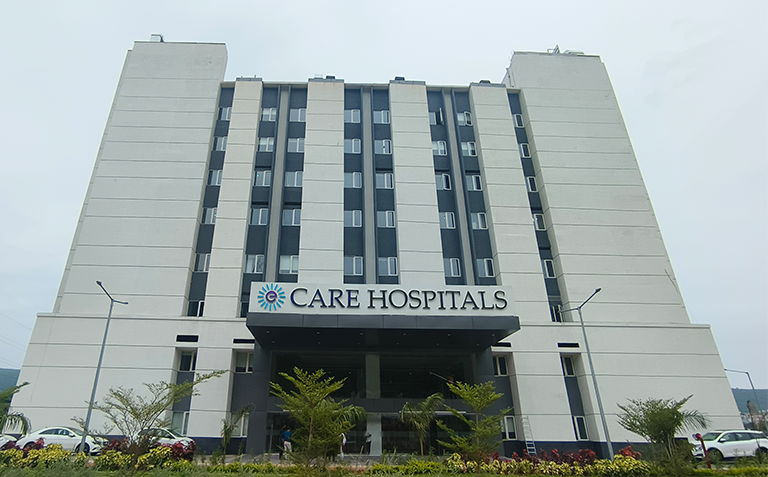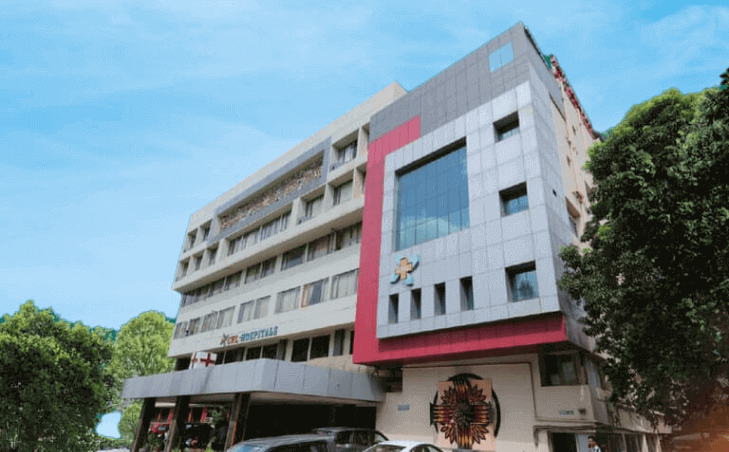-
Doctors
-
Specialities & Treatments
Centre of Excellence
Specialties
Treatments and Procedures
Hospitals & Directions HyderabadCARE Hospitals, Banjara Hills CARE Outpatient Centre, Banjara Hills CARE Hospitals, HITEC City CARE Hospitals, Nampally Gurunanak CARE Hospitals, Musheerabad CARE Hospitals Outpatient Centre, HITEC City CARE Hospitals, Malakpet
HyderabadCARE Hospitals, Banjara Hills CARE Outpatient Centre, Banjara Hills CARE Hospitals, HITEC City CARE Hospitals, Nampally Gurunanak CARE Hospitals, Musheerabad CARE Hospitals Outpatient Centre, HITEC City CARE Hospitals, Malakpet Raipur
Raipur
 Bhubaneswar
Bhubaneswar Visakhapatnam
Visakhapatnam
 Nagpur
Nagpur
 Indore
Indore
 Chh. Sambhajinagar
Chh. SambhajinagarClinics & Medical Centers
Book an AppointmentContact Us
Online Lab Reports
Book an Appointment
Consult Super-Specialist Doctors at CARE Hospitals
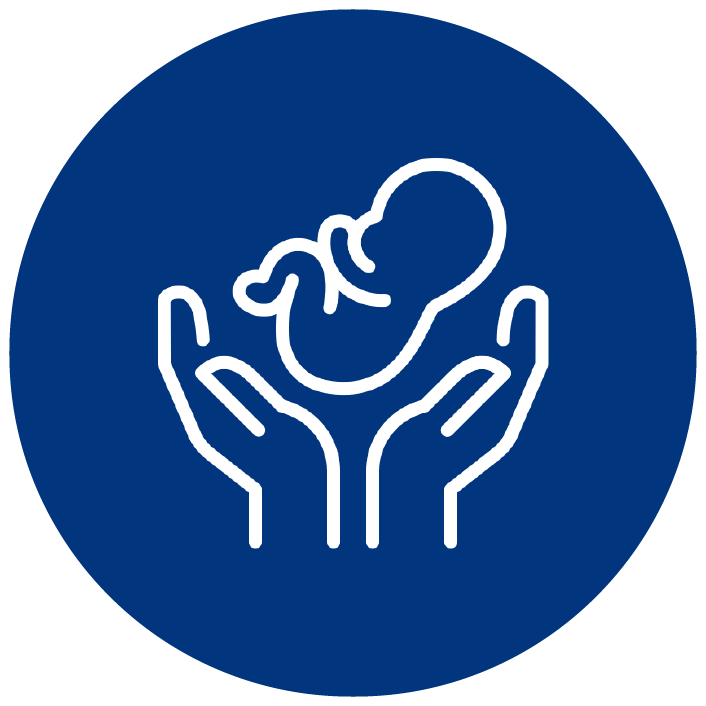
Paediatric Cardiac Surgery
Paediatric Cardiac Surgery
Pediatric Cardiac Surgery Hospitals in Hyderabad
CARE Hospitals is one of the best pediatric cardiology hospitals in Hyderabad for paediatric cardiovascular (heart) surgery.
Cardiac surgery in children is recommended when a child suffers from severe heart disease. It helps repair heart defects so the child can have a healthy life. Some heart diseases may require immediate surgery after birth. In severe cases, these surgeries are performed for even months or years after childbirth. The type of surgery required and its number depend on the severity of the condition. These surgeries are performed by experienced and well-trained paediatric heart surgeons to provide comprehensive care to your child.
At CARE Hospitals, minimally invasive treatment procedures are taken into consideration at first. If they do not go well, our healthcare team is at the forefront to use more invasive methods to reduce the risks of infection. This is the most sensitive period for parents. We understand their situation and therefore offer them the best services for their child. We regularly communicate with them and provide their child's treatment update.
Our expertise in paediatric cardiac surgery
CARE Hospitals has been the best medical centres for parents who want the best treatment for their child. Our multidisciplinary surgical and medical team work together to review the cases. Our paediatric cardiac surgeons can treat various diseases. Here, we offer the following types of paediatric cardiac surgery.
-
Structural heart disease and valve repair- CARE Hospital surgeons are experts in assessing and treating people diagnosed with heart diseases or valve conditions like aortic valve diseases, bicuspid and tricuspid regurgitation, and single-ventricle valve problems. Our surgeons also provide surgeries on the aorta, especially in children with Marfan syndrome, aortic valve disease and other connective tissue diseases.
-
Hypertrophic cardiomyopathy and septal myectomy- Surgeons at CARE hospitals use the best surgical methods for obstructive and nonobstructive cardiomyopathy. Further, our surgeons and researchers are working on making advances in imaging, defibrillator strategies and arrhythmia treatment to prevent unexpected death.
-
Heart failure procedures and heart transplants- CARE Hospital is one of the leading medical centres for treating patients with a single ventricle. We also provide the facility of heart transplants in newborns and adults to ensure their health.
-
Minimally invasive - These days, the technology for treating structural heart diseases is increasing rapidly. In some cases, minimally invasive techniques can be used. This results in less pain and decreases recovery time. Our multidisciplinary team ensures that all treatment options are considered so that every individual can get the correct treatment at the correct time.
-
Ventricular assist device insertion- We provide the facility of ventricular assist device (VAD) insertion. It is a mechanical pump that helps restore blood flow and heart function.
-
Foetal cardiac interventions- CARE hospitals are at the forefront of foetal cardiac interventions to provide early treatment. Our maternal-foetal specialists work together to facilitate various complex interventions for cardiac diseases. This results in extensive care both for the mother and the developing child or foetus and ensures a smooth transition from foetal life to birth.
Risk factors of paediatric cardiac surgery
Associated risks with paediatric cardiac surgery include-
-
Renal complications
-
Anaemia
-
Respiratory issues
-
Gastrointestinal issues
-
Infection
-
Need for the incubation of the trachea
-
Vascular complications
At CARE hospitals, these risks can be reduced with effective treatment options and proper medications.
Diagnosis of paediatric cardiac conditions
At CARE Hospitals, various tests are performed to diagnose heart problems in children. At the appointment, our paediatric cardiologists take the medical history of the patient and perform a physical exam. An electrocardiogram (ECG), chest X-ray and echocardiogram (forms ultrasound images of the heart) are suggested for the diagnosis. Further, blood tests are also important for patients with cyanosis (bluish discolouration of the skin) and single ventricle hearts.
Our cardiology staff talks about every test with the child's parents and explains the procedures. After the tests are done, our cardiologists elaborate on the results and whether the follow-up is required or not.
Sometimes, initial tests don't provide much information about the condition, and more tests may be required. These include angiography and cardiac catheterization, CT Scanning and magnetic resonance imaging (MRI), Holter recording and stress testing.
The procedure of paediatric cardiac surgery
The procedure of paediatric cardiac surgery includes three phases.
Phase 1- Before the surgery
Initially, the idea of surgery is scary both for parents and a child. So helping a child to get prepared for the surgery is an important part of the process. A child initially asks questions about the process from his parents, so they should make sure that they answer them correctly to clear their child's doubts. Parents can also seek help from the doctor or medical staff for the same. Also, parents should tell the child how the surgery will be performed, what will happen before, during and after the surgery. They must reassure them that their pain will be relieved with medications in the entire process.
Phase 2- During the surgery
The child is given general anaesthesia so he can fall asleep and be pain-free during the process. Then, the surgeon makes an incision in the chest. He cuts a part of the child's breastbone to expose the heart. Once the heart is visible, the child is connected to a bypass machine. It moves blood away from the heart so the surgeon can perform the procedure. He cuts a healthy vein or artery to form a new pathway around the damaged artery. Then, he uses the wire to close the breastbone and leaves it (wire) in the body. Thereupon, the outer incision is stitched.
Phase 3- After the surgery
The child can feel some pain after the process, he is given medications to relieve pain. Parents can see some changes in their child's behaviour. At this time, they should support them and handle them with care.
How can CARE hospitals help?
CARE Hospitals meet international treatment standards. Our medical centre is established to provide the best medical facilities in the field of cardiology to every patient. Our operating team consists of the best surgeons and cardiologists who are dedicated to their work and are supported by compassionate staff members to provide pre-operative and post-operative care.
Our Locations
CARE Hospitals, a part of the Evercare Group, brings international quality healthcare to serve patients across the world. With 17 healthcare facilities serving 7 cities across 6 states in India, we are counted among the top 5 pan-Indian hospital chains.
-
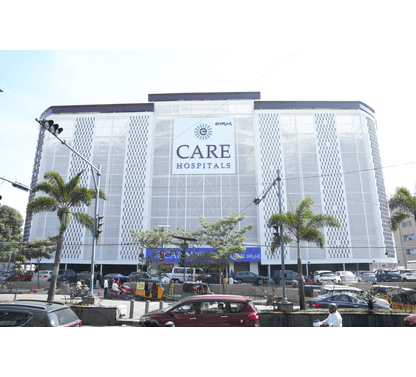
CARE Hospitals, Banjara Hills, Hyderabad
Road No.1, Banjara Hills, Hyderabad, Telangana - 500034
-
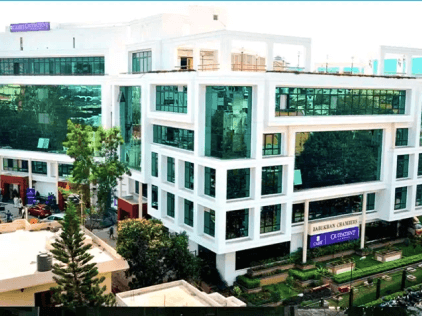
CARE Hospitals Outpatient Centre, Banjara Hills, Hyderabad
BabuKhan Chambers, Road No.10, Banjara Hills, Hyderabad, Telangana - 500034
-
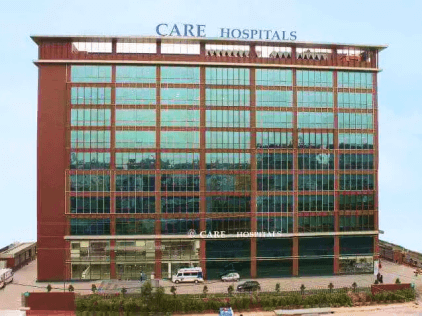
CARE Hospitals, HITEC City, Hyderabad
Old Mumbai Highway, Near Cyberabad Police Commissionerate, Jayabheri Pine Valley, HITEC City, Hyderabad, Telangana - 500032
-
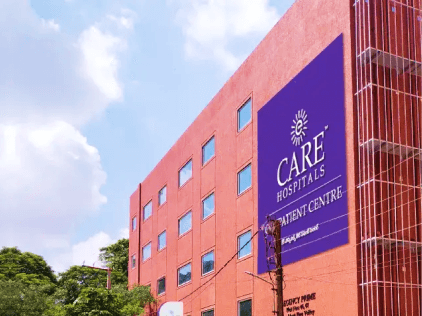
CARE Hospitals Outpatient Centre, HITEC City, Hyderabad
Jayabheri Pine Valley, Old Mumbai Highway, Near Cyberabad Police Commissionerate HITEC City, Hyderabad, Telangana - 500032
-
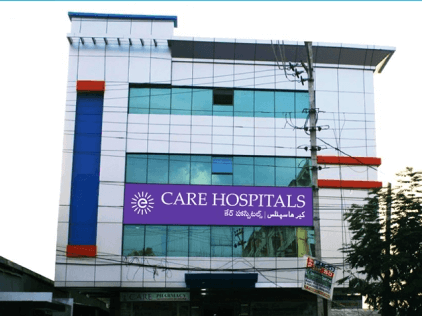
Gurunanak CARE Hospitals, Musheerabad, Hyderabad
1-4-908/7/1, Near Raja Deluxe Theatre, Bakaram, Musheerabad, Hyderabad, Telangana – 500020
-
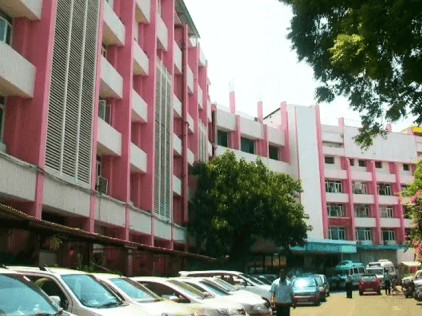
CARE Hospitals, Nampally, Hyderabad
Exhibition Grounds Road, Nampally, Hyderabad, Telangana – 500001
-
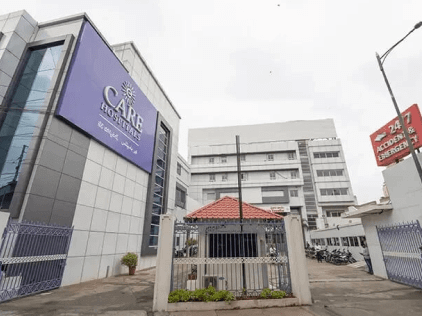
CARE Hospitals, Malakpet, Hyderabad
16-6-104 to 109, Old Kamal Theater Complex Chaderghat Road, Opp Niagara Hotel, Chaderghat, Hyderabad, Telangana - 500024
-
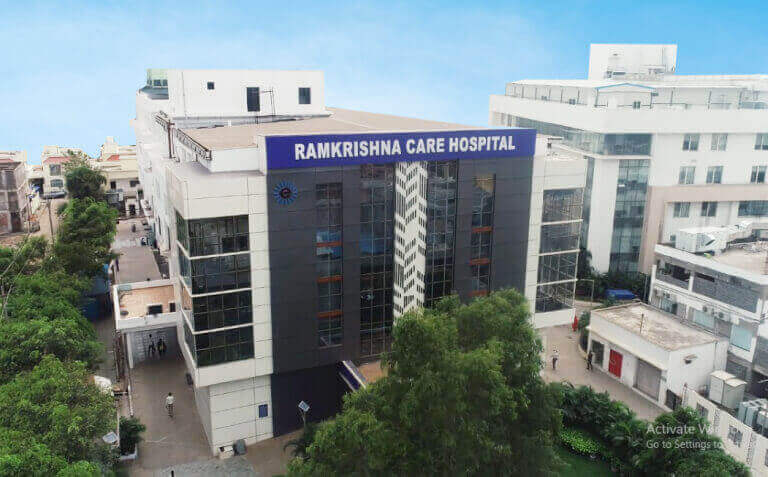
Ramkrishna CARE Hospitals, Raipur
Aurobindo Enclave, Pachpedhi Naka, Dhamtari Road, Raipur, Chhattisgarh - 492001
-
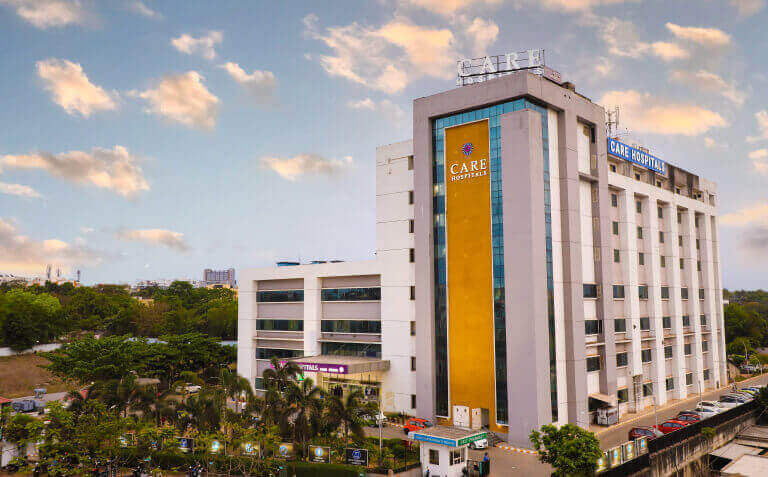
CARE Hospitals, Bhubaneswar
Unit No.42, Plot No. 324, Prachi Enclave Rd, Rail Vihar, Chandrasekharpur, Bhubaneswar, Odisha - 751016
-
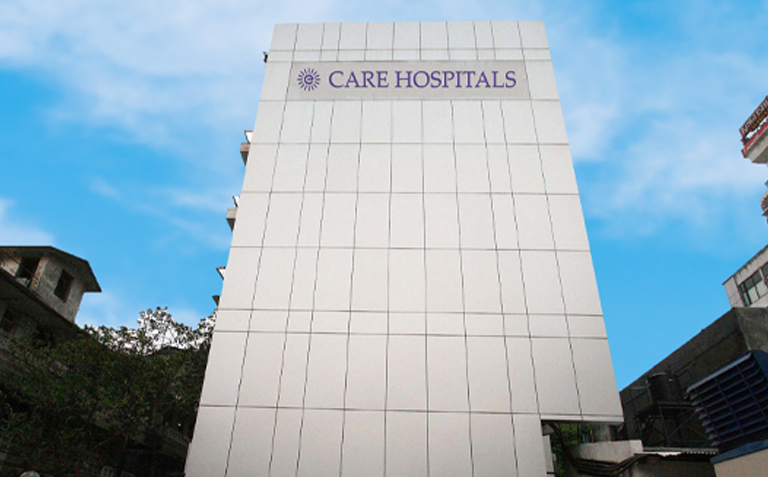
Ganga CARE Hospital Limited, Nagpur
3 Farmland, Panchsheel Square, Wardha Road, Nagpur, Maharashtra – 440012
-
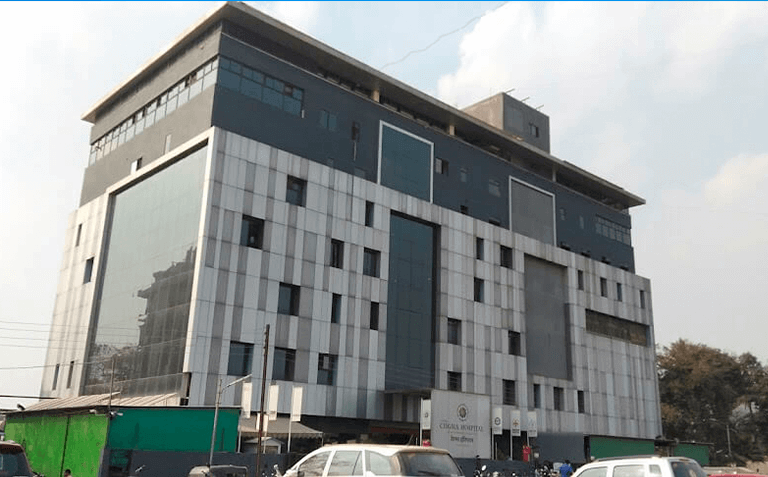
United CIIGMA Hospitals (A unit of CARE Hospitals), Chh. Sambhajinagar
Plot no 6, 7, Darga Rd, Shahnoorwadi, Chh. Sambhajinagar, Maharashtra 431005
-
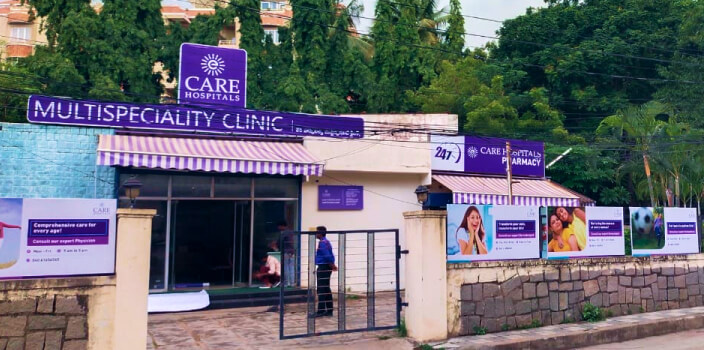
CARE Multispeciality Clinic, Srinagar Colony, Hyderabad
8-3-1101/1, Care Clinic, Plot No 105 A, Srinagar Colony Main Rd, Beside MCH Park, Venkateshwara Hills, Banjara Hills, Hyderabad, Telangana 500073
-
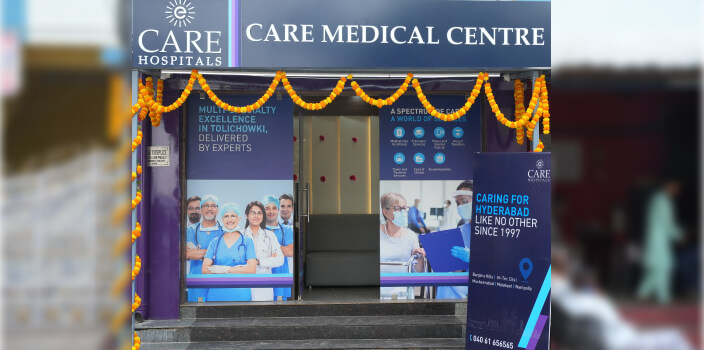
CARE Medical Center, Tolichowki, Hyderabad
366/B/51, Paramount Hills, IAS Colony, Tolichowki, Hyderabad, Telangana 500008
Still Have a Question?



